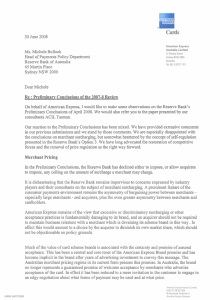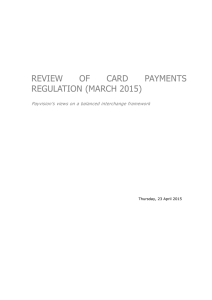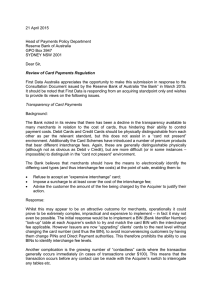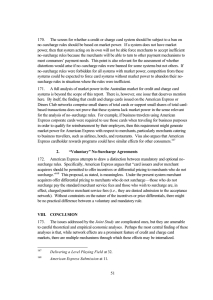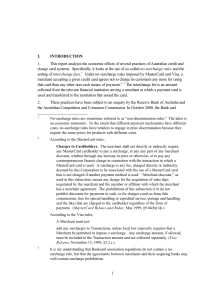Commonwealth Bank of Australia ABN 48 123 123 124 Level 6
advertisement
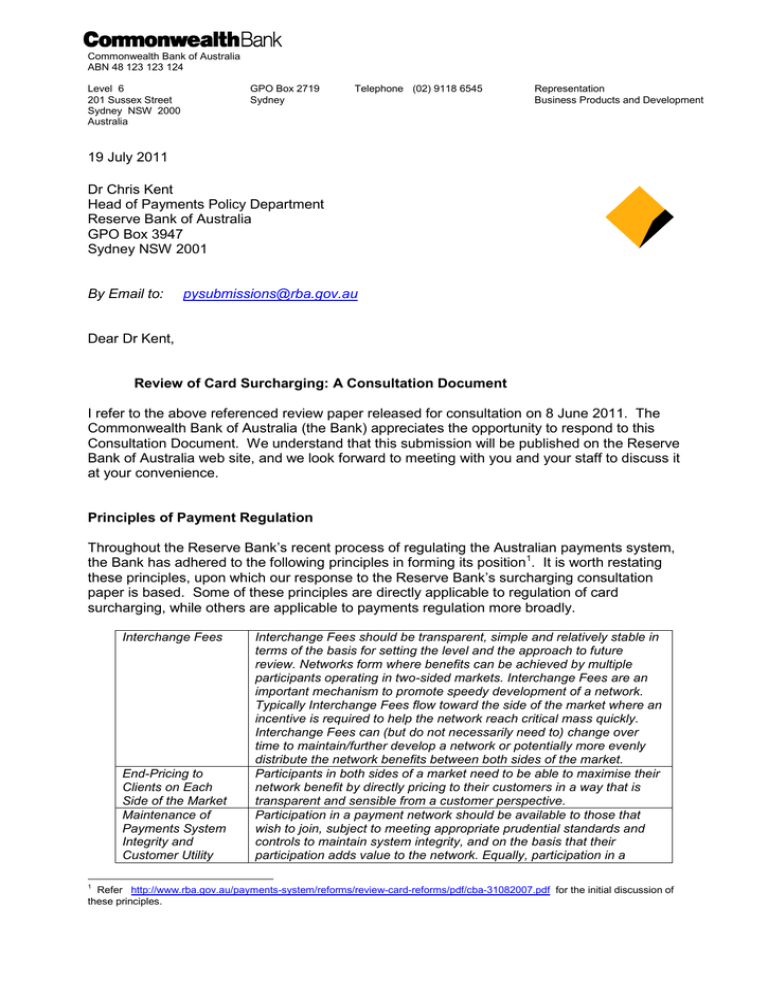
Commonwealth Bank of Australia ABN 48 123 123 124 Level 6 201 Sussex Street Sydney NSW 2000 Australia GPO Box 2719 Sydney Telephone (02) 9118 6545 Representation Business Products and Development 19 July 2011 Dr Chris Kent Head of Payments Policy Department Reserve Bank of Australia GPO Box 3947 Sydney NSW 2001 By Email to: pysubmissions@rba.gov.au Dear Dr Kent, Review of Card Surcharging: A Consultation Document I refer to the above referenced review paper released for consultation on 8 June 2011. The Commonwealth Bank of Australia (the Bank) appreciates the opportunity to respond to this Consultation Document. We understand that this submission will be published on the Reserve Bank of Australia web site, and we look forward to meeting with you and your staff to discuss it at your convenience. Principles of Payment Regulation Throughout the Reserve Bank‟s recent process of regulating the Australian payments system, the Bank has adhered to the following principles in forming its position1. It is worth restating these principles, upon which our response to the Reserve Bank‟s surcharging consultation paper is based. Some of these principles are directly applicable to regulation of card surcharging, while others are applicable to payments regulation more broadly. Interchange Fees End-Pricing to Clients on Each Side of the Market Maintenance of Payments System Integrity and Customer Utility 1 Interchange Fees should be transparent, simple and relatively stable in terms of the basis for setting the level and the approach to future review. Networks form where benefits can be achieved by multiple participants operating in two-sided markets. Interchange Fees are an important mechanism to promote speedy development of a network. Typically Interchange Fees flow toward the side of the market where an incentive is required to help the network reach critical mass quickly. Interchange Fees can (but do not necessarily need to) change over time to maintain/further develop a network or potentially more evenly distribute the network benefits between both sides of the market. Participants in both sides of a market need to be able to maximise their network benefit by directly pricing to their customers in a way that is transparent and sensible from a customer perspective. Participation in a payment network should be available to those that wish to join, subject to meeting appropriate prudential standards and controls to maintain system integrity, and on the basis that their participation adds value to the network. Equally, participation in a Refer http://www.rba.gov.au/payments-system/reforms/review-card-reforms/pdf/cba-31082007.pdf for the initial discussion of these principles. 2 Network SelfManagement Regulator Intervention Competitive Neutrality in Regulation Economic Efficiency in Regulation network should not necessarily be mandated. Payments participants should be free to determine how best to serve their customers. Where a payment network is built on the above principles, it is the Bank’s view that there is no need for regulation and that network owners/participants should be able to self-manage, with transparency in approach and review. Regulator intervention should only occur when there has been demonstrated market failure. Where there is evidence of market failure, any regulation should be transparent and provide certainty given the impact on innovation, ongoing maintenance investment and the cost of implementing regulated change. Where there is evidence of market failure, any regulation should be competitively neutral, that is, it should not favour one business or type of business over others. If an access regime is to be established that guarantees right of access to a network then those regulated to participate should, at least, be reimbursed for the economic costs incurred of supporting new entrants joining the network and any ongoing economic costs. This is consistent with the approach in the 2 Trade Practices Act . Where there is evidence of market failure, the Bank retains its view that a focus simply on current costs as a measure for economic efficiency is too narrow in terms of scope and timeframe. Any assessment of the efficiency of various payment systems should consider all relevant factors, in particular, the structure of the original development of those systems, the value ascribed by customers, relative capabilities of those payment systems and the incentives to invest. A number of the above principles are relevant to the current consultation and we wish to draw attention to the following three: 1 Transparency We believe that any surcharging applied by merchants must be transparent at the point of sale (and prior to “check out” in an on-line environment). Transparency, we believe, is important in encouraging competitive responses. We believe that this requirement could be more effectively adopted and enforced than is currently the case. 2 Market Failure The Bank believes a demonstrated market failure is necessary to justify payments regulation. Any restriction upon a merchant‟s freedom to surcharge equates to regulation, and should firstly be justified by identification of such a failure. While the Consultation paper details the Reserve Bank‟s concerns about merchant surcharging practices, we believe that the incidence of „excessive‟ surcharging, while frequently publicised, is relatively isolated to a small number of merchants taking advantage of market power and an uninhibited freedom to surcharge. While some „fine tuning‟ may be justified, we do not, however, believe that such instances amount to widespread market failure that would warrant a heavy handed regulatory intervention. 2 Now known as the Competition and Consumer Act 2010 3 3 Competitive Neutrality Regulation should not favour one business type over another. Surcharging that does not reflect underlying merchant costs, and the differences in these costs between card schemes, creates an arbitrage opportunity for the merchant that is, we contend, unwarranted. These principles underpin more detailed comments presented below. The Reserve Bank’s Policy Options The 8 June Consultation Document outlines a couple of options in relation to capping of surcharges and also discusses differential surcharging. These are considered below. i. Capping of Surcharges Option 1 as outlined by the Reserve Bank proposes that an across the board cap on surcharging is applied to all merchants accepting payments within a card scheme. We believe that this option will encourage merchants to surcharge up to the capped level which may be well above their cost of acceptance. In fact, depending on where the cap is set, it may only restrict a minority of merchants. Those merchants with a relatively low merchant service fee will still be free to surcharge at a rate up to the level of the cap, thereby allowing them to continue to surcharge profitably. We believe that such profiteering was never envisaged by the Reserve Bank. Option 1 will not be competitively neutral as it will allow merchants on low merchant service fees, typically larger merchants, to surcharge well in excess of cost, while merchants with a higher merchant service fee, will not be able to generate the same level of cost recovery from surcharging as larger merchants. Option 2 (which envisages surcharging to be reflective of merchant costs) has a better prospect of achieving the Reserve Bank‟s implied aim of preventing merchants from surcharging significantly in excess of that cost. Option 2 proposes introducing regulation that requires any surcharge to be reasonably related to the merchant‟s cost of acceptance. In the interests of simplicity, we support defining a merchant‟s acceptance cost as their merchant service fee in most instances. To preserve commercial confidentiality, we believe there needs to be a level of tolerance above the merchant service fee up to which a merchant can surcharge. For instance, merchants could be limited to surcharging at a rate no greater than their merchant service fee plus a small fixed margin. This will allow merchants to set a simple surcharging price for their customers, by rounding to the nearest whole number. Option 2 is an acceptable prospect for limiting surcharging prices because it is competitively neutral, and it still allows merchants to set transparent and sensible surcharging prices. Furthermore, a level of tolerance will also provide merchants with a margin to compensate for additional acceptance costs that they may incur beyond the merchant service fee. It is advisable that the Reserve Bank consults as to the level of tolerance permitted if it were to pursue Option 2. In particular, some businesses with a high volume of forward dated sales may be required by their acquirer to keep a certain amount of funds on deposit due to the risk arising from prepayment. Such costs, if applicable, form part of the reasonable cost of credit card acceptance for these merchants. Furthermore, some large merchants own and operate their own PINpad fleet and these costs are not incorporated in their merchant service fee. Consistent with this light handed approach to curbing excessive surcharging, monitoring of the relationship between surcharge levels and relevant costs should, we believe, be largely on an 4 exceptions basis under the jurisdiction of the Australian Securities and Investments Commission (ASIC) who is charged with ensuring that financial markets are fair and transparent and supported by confident and informed investors and consumers. ASIC already exercises oversight over surcharging practices and seems well placed to provide additional monitoring as the need arises. ii. Differential Surcharging The Bank supports differential surcharging by card scheme. Differential surcharging, based on the genuine costs of accepting that schemes‟ cards, is competitively neutral across card schemes as noted above. Furthermore, differential surcharging by scheme still allows merchants to offer transparent and sensible pricing to their customers. We also support distinguishing between „credit‟ and „debit‟ products – again on the basis of merchants‟ genuine costs of acceptance. Differential surcharging by card scheme would be a logical corollary if the Reserve Bank introduces a cap on surcharging that is reflective of the merchant‟s reasonable cost of card acceptance or merchant service fee. Under such a scenario, merchants may no longer be able to set a single surcharging price that both covers their cost of acceptance across all card schemes, and complies with the conditions of the cap. In this situation, a merchant would need to set separate surcharging rates for various card brands in order to comply with the cap and still recover their acceptance costs. The Bank does not support differential surcharging of card categories within a single card scheme. Such a proposal fails against the principle of delivering transparent and sensible pricing to customers. Instinctively, it seems a remote prospect that merchants would embrace differential surcharging by setting a price for each category of scheme interchange. Interchange fee schedules set by card schemes are both lengthy and complex. To surcharge according to interchange category, merchants would have to set a long price list of surcharging prices and explain the application of these prices to their customers at the point of sale. The complexities involved in differential surcharging by interchange category become apparent by way of an example. MasterCard has an interchange fee of 0.385% for PayPass transactions, and an EMV premium interchange fee of 1.1%3. If a merchant wants to differentially surcharge these two categories of interchange fees, it would need to know prior to the commencement of payment whether a platinum cardholder intended to tap their card to facilitate a PayPass transaction or insert their card and complete an EMV transaction. This would be extremely cumbersome for merchants, requiring significant changes to their operational process at the point of sale. As a further example, for an on-line merchant to differentially surcharge between two categories, it would need to be able to determine the interchange category of a card without seeing it. The merchant would then need to explain to its customers which interchange category applies to the customer‟s card. The level of information necessary for a web merchant to achieve this is currently not available. Web merchants cannot rely on a card‟s BIN to assign its interchange category, since many BINs contain a mix of interchange categories. A BIN can contain multiple interchange categories when, for instance, a card product is upgraded from standard to gold card branding and the interchange classification changes accordingly. The possibility of such upgrades means that the only potential means for a web merchant to determine the interchange category of a card would be based upon the card number. Point of sale merchants could face difficulties similar to web merchants in determining a card‟s interchange category unless it is printed on the card. 3 See http://www.mastercard.com/au/merchant/en/rba/index.html 5 For these reasons, differential surcharging below Scheme level is, we think, unworkable. iii. Merchant Service Fee Information The Bank‟s merchants with a blended merchant service fee are able to readily access information on their costs, and composition, of card acceptance – as are „interchange-plus‟ merchants. However, an acquirer should not be compelled to offer „interchange-plus‟ pricing to all merchants – many merchants prefer the simplicity of blended rates. Calculation of the weighted average interchange fee paid by „interchange-plus‟ merchants is a simple calculation that should be possible based upon most merchants‟ existing monthly statements. It is unlikely any „interchange-plus‟ merchant would require an amendment to the RBA‟s Standards in order to obtain this information. iv. Disclosure Merchants should not be obligated to publicly disclose the merchant service fee they pay to their acquirer. Any such requirement would breach the commercial confidentiality that currently applies to both the merchant and acquirer in an acquiring contract. Parties to a commercial contract in a competitive marketplace are entitled to commercial confidentiality. We believe that mandatory disclosure of merchant service fees would breach the principle of competitive neutrality by providing a merchant‟s competitors with information on its cost of doing business. The Bank does perceive a need for the Reserve Bank to collect additional data on merchant service fees according to merchant category. The existing statistical release on average merchant service fees provides merchants with beneficial information for negotiating with potential acquirers. If statistics on average merchant service fees were broken down according to merchant category, it may encourage some merchants to misrepresent the nature of their business to potential acquirers. Other Considerations While the above discussion has concentrated on surcharging as it relates to acceptance of card based payments, we believe it would be wrong to overlook merchant acceptance costs associated with other payment channels such as cash or cheques. The costs of accepting such payments are frequently “hidden” and less transparent than for card payments, yet no less real, and we urge greater public discussion around such costs. The Reserve Bank‟s “Strategic Review of Innovation in the Payments System” documents released subsequent to the surcharging Consultation Document, provides some additional information in this regard, but we remain concerned that a focus on card acceptance costs in isolation (and, indeed, surcharging thereof), may inadvertently diminish the attraction of card acceptance vis-a-vis these other, less efficient, channels. The Reserve Bank has frequently spoken of the importance of efficiency in payments, and focussing on surcharging for card acceptance in isolation from substitute payment instruments may mitigate against this goal. We encourage greater public debate, with supporting data and analytics, around this issue and we believe that the Reserve Bank is well placed to contribute to, and shape, this debate. We would be happy to assist such endeavours if required. 6 Summary of the Commonwealth Bank’s Position The Commonwealth Bank has long argued in support of the Reserve Bank stepping back from ongoing payment system regulation. This remains our preferred option. We also understand that a decision to surcharge, or not, remains a matter for the merchant. However, we suggest that merchant profiteering through application of excessive surcharging, even if isolated, was never intended to be a by-product of the Reserve Bank‟s Standards. Some instances of such behaviour have been discussed in the current Consultation Document and thus we appreciate the case for some relatively minor fine tuning, in a manner consistent with our above principles, to address such issues. Against this background, our position can thus be summarised as: - We do not support an absolute cap on surcharging (Option 1). - We believe that requiring the price of a merchant‟s surcharge to be no greater than its cost of acceptance (Option 2), including a small, fixed, margin, is a viable approach. - We support differential surcharging by card scheme. - We do not support differential surcharging by interchange category within a card scheme. - We do not support mandatory disclosure of merchant service fees. - We do not consider it necessary for the Reserve Bank to collect merchant service fee data broken down according to merchant category. Thank you again for the opportunity to contribute to this consultation. We would be pleased to meet with you to discuss any aspect of this Submission and request that you contact the writer directly should you wish to do so. Yours sincerely [Signed] Stuart Woodward General Manager Representation
